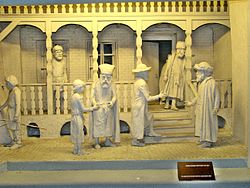This article includes a list of general references, but it lacks sufficient corresponding inline citations. (October 2016) |

The Council of Four Lands (Hebrew: ועד ארבע ארצות, Va'ad Arba' Aratzot) was the central body of Jewish authority in the Polish–Lithuanian Commonwealth from the second half of the 16th century to 1764, located in Lublin. The Council's first law is recorded as having been passed in 1580.[1] Seventy delegates from local kehillot met to discuss taxation and other issues important to the Jewish community. The "four lands" were Greater Poland, Little Poland, Galicia (with Podolia) and Volhynia.[2] The earliest form of the Council was organized in 1514 by Sigismund I the Old and Abraham of Bohemia was put in charge of it.[3]
In Polish it was referred to as the Jewish Sejm (Polish: Sejm Żydowski).[4] In Latin it was referred to as the Jewish General Congress (Latin: Congressus Generalis Iudaicus, or Congressus Generalis Iudaeorum).[5]
The terms "Council of Three Lands" and "Council of Five Lands" and more have also been used for the same body. In 1623 the Jewish communities from the Grand Duchy of Lithuania withdrew from the "Council of Four Lands" and established "the Council of the Land of Lithuania" (Va’ad Medinat Lita, sometimes translated as simply "the Council of Lithuania".[1])
- ^ a b The Cambridge Dictionary of Judaism and Jewish Culture, p. 117 (browse for "skhumot" online) (see also: [the article about] "Jewish poll tax")
- ^ "COUNCIL OF FOUR LANDS - JewishEncyclopedia.com". www.jewishencyclopedia.com. Retrieved 2017-03-30.
- ^ "YIVO | Bohemus, Abraham Judeus". yivoencyclopedia.org. Retrieved 2020-07-31.
- ^ "Councils", The YIVO Encyclopedia of Jews in Eastern Europe
- ^ Akao Mitsuharu; Mukai Naoki, eds. (2017). Yudayajin to jichi : chūtōō roshia ni okeru diasupora kyōdōtai no kōbō (in Japanese). Tokyo: Iwanami. p. 29. ISBN 9784000254267.